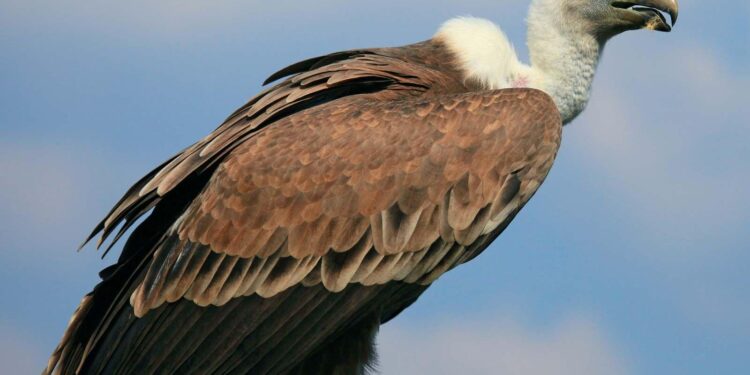Disappearing Vultures: Hidden Environmental and Economic Impacts, According to University of Exeter Research
A recent investigation by the University of Exeter highlights a pressing environmental concern regarding the rapid decline of vulture populations globally. These often-neglected scavengers are vital for ecosystem stability and human health, as they efficiently dispose of animal remains and curb disease proliferation. With ongoing threats from human activities jeopardizing their existence, researchers caution that the loss of these avian sanitation workers could trigger unforeseen repercussions for wildlife and human communities alike. The study prompts essential discussions about biodiversity, public health, and ecosystem interdependence, emphasizing an urgent call for conservation initiatives to safeguard these indispensable birds before it is too late.
Effects of Vulture Population Decline on Ecosystems and Biodiversity
The significant reduction in vulture numbers worldwide has consequences that extend beyond their role as scavengers. These birds are integral to maintaining ecological equilibrium by consuming carcasses that would otherwise decompose and potentially spread diseases. A decrease in vulture populations can lead to an increase in other scavengers like feral dogs or rats, which may elevate the risk of zoonotic diseases affecting both wildlife and humans. Consequently, the absence of vultures can create a domino effect throughout ecosystems—altering food chains and disrupting interactions among various species.
Moreover, vultures play a pivotal role in promoting biodiversity through nutrient cycling that supports diverse plant life. Their feeding habits return vital nutrients to the soil, fostering plant growth that serves as habitat for numerous organisms. Without these avian custodians, soil quality may deteriorate alongside plant diversity—a critical issue since diminished plant species can lead to habitat loss affecting herbivores’ resources while also impacting predator species reliant on them for sustenance. As illustrated by these intricate relationships within ecosystems, declining vulture populations signify more than just a loss of bird species; they indicate potential environmental crises capable of threatening overall biodiversity.
Financial Implications of Vulture Extinction for Local Economies
The diminishing numbers of vultures might seem primarily an ecological concern; however, its economic ramifications on local communities could be substantial. By scavenging carcasses effectively—thereby preventing disease spread—vultures contribute significantly to environmental balance within their habitats. The absence or decline in these birds could present serious challenges for communities such as:
- Heightened Health Risks: Without vultures managing decaying animal remains effectively, there may be increased incidences of diseases leading to higher healthcare expenses within local populations.
- Livestock Vulnerability: Farmers might face greater livestock losses due to diseases typically controlled by vultures’ presence—impacting both livelihoods and food security.
- Erosion in Eco-Tourism: Regions dependent on biodiversity attractions may see diminished eco-tourism opportunities due to declining vulture numbers—resulting in reduced income streams for local guides and businesses.
The financial strain on local economies extends into agricultural sectors reliant upon healthy ecosystems as well. Current data underscores potential costs associated with vanishing vultures illustrated below:
| Impact Area | Estimated Annual Financial Impact ($) |
|---|---|
| Healthcare Costs Increase | $50,000 |
| Cattle Losses Due To Disease | $100,000 |
This financial burden emphasizes how crucial it is to protect vulture populations; safeguarding them is essential not only for ecological reasons but also because it directly affects community sustainability.
Approaches To Conserve Vultures And Maintain Ecosystem Health
A comprehensive strategy is necessary if we aim to reverse the alarming trend concerning declining vulture numbers—a strategy focused on habitat preservation alongside legal protections while engaging community involvement.Main strategies include:
- Sustaining Natural Habitats: Protecting ecosystems where vultures thrive is paramount; this includes enforcing anti-deforestation measures while preserving nesting sites along with ensuring adequate food sources remain available.
- A Raising Awareness Campaigns: Informing people about how crucial vultures are ecologically can foster grassroots conservation efforts while dispelling negative stereotypes surrounding these birds.
- Tightening Regulations Against Poaching: Stricter laws against poaching or poisoning will not only benefit vultures but also other scavenger species sharing their environment.
- Community Engagement Initiatives: Involving locals actively promotes sustainable practices while creating advocates who champion conservation efforts aimed at protecting vulnerable bird populations.
Additionally breeding programs hold promise when reestablishing dwindling vulture groups across affected regions; collaboration between conservatories along with wildlife sanctuaries should focus heavily upon developing reliable breeding networks prioritizing genetic diversity.Economic incentives< / strong >can further bolster conservation endeavors—as demonstrated below:
| Conservation Initiative | Potential Economic Gain | Increased revenue from nature tourism | < tr >< td >Community-Centric Conservation | Job creation & sustainable livelihoods | < tr >< td >Research & Educational Programs | (Grants & funding opportunities) |
By implementing such strategies we stand not only preserve vital avian species but maintain essential balances within our interconnected ecosystems. h2 id=“conclusion”Key Insights The troubling decline observed among global vulturine populations—as highlighted through research conducted at University Of Exeter—serves as an urgent wake-up call regarding broader environmental issues extending far beyond mere losses amongst individual bird types.The cascading effects resulting from disappearing avians could result into heightened disease transmission rates disrupted natural systems alongside considerable economic burdens placed onto those relying heavily upon healthy landscapes.As experts advocate immediate action towards conserving this unique group—it becomes increasingly important policymakers activists citizens alike recognize just how integral each member plays within our shared ecosystem.Addressing this matter isn’t solely critical towards saving specific bird types—it’s equally imperative toward ensuring overall planetary health moving forward.Time waits no longer without concerted responses—we risk losing not just irreplaceable creatures but stability across environments we all share together! |
|---|










